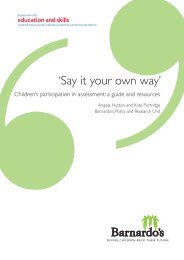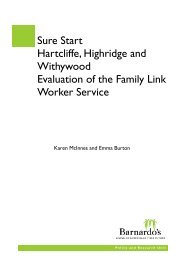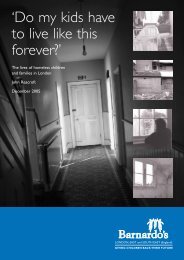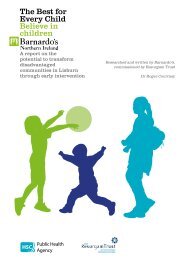Splintered Lives - Barnardo's
Splintered Lives - Barnardo's
Splintered Lives - Barnardo's
Create successful ePaper yourself
Turn your PDF publications into a flip-book with our unique Google optimized e-Paper software.
Detached Intervention Team) a <strong>Barnardo's</strong> project working with young men; New<br />
Horizons - outreach to young people involved in the sex industry in the Kings Cross<br />
area; Safe in the City - a Manchester Children's Society project aimed at under 16's; City<br />
Centre Project - a Manchester youth advocacy project with an outreach/detached team.<br />
The experience of organisations in developing countries also offer insight into what is<br />
needed. O'Grady (1992) reports that the success rates of basic rehabilitation<br />
programmes are currently very limited. Explanations for this emphasise that children's<br />
perceptions of themselves and of life have been changed in complex ways, and it would<br />
be virtually impossible for them to return to the villages they came/were trafficked from.<br />
Consequently children vacillate between wanting to get out and returning to the sex<br />
industry. The simple fact is that working in the sex industry means they eat.<br />
A number of children's projects have been developed focusing not just on survival<br />
alternatives, but working with children using education and campaigning. For example<br />
Bahay Taluyan is located in the centre of the Manila sex industry. They are aware that<br />
they can have limited impact on the scale of the problem, but attempt empowerment<br />
through education, encouraging children (and their parents) to understand why and<br />
how they are kept poor and exploited. They are also active in targeting campaigns<br />
against abusers, one example being a rally of children and mothers outside the<br />
Philippine Senate against an English abuser, Steve Mitchell. He left the area soon<br />
afterwards. Preda in Olongapo undertakes similar work, and has publicised the names<br />
of a number of known local multiple abusers. Projects initiated as a result of selforganisation<br />
of devadasis in India (Aziz, 1995), have included homes for elderly women.<br />
bank loans to set up small businesses, and challenging the institution of devadasi itself.<br />
Foundation for Women based in Bangkok has produced a picture story book, based on<br />
the life of one of the girls who died in a fire in a brothel in 1984, and taken this out to<br />
many villages in Northern Thailand to provide girls with information in the hope that<br />
this will prevent some being deceitfully recruited. .<br />
The most radical organisations in Asia are combining support work with children,<br />
making abusers publicly known, advocating for justice, media campaigns and broad<br />
education and awareness. They are aware that focusing only on the supply of children<br />
will never be effective, rather the spotlight must shift to the demand side - the abusers<br />
and procurers, and the underlying structural causes of economic and social in equality.<br />
PAGE 73<br />
chapter<br />
12
















